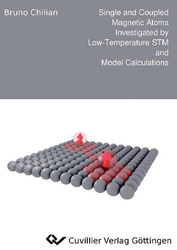| Departments | |
|---|---|
| Book Series (97) |
1382
|
| Nachhaltigkeit |
3
|
| Gesundheitswesen |
1
|
| Humanities |
2376
|
| Natural Sciences |
5408
|
| Mathematics | 228 |
| Informatics | 320 |
| Physics | 980 |
| Chemistry | 1364 |
| Geosciences | 131 |
| Human medicine | 243 |
| Stomatology | 10 |
| Veterinary medicine | 108 |
| Pharmacy | 147 |
| Biology | 835 |
| Biochemistry, molecular biology, gene technology | 121 |
| Biophysics | 25 |
| Domestic and nutritional science | 45 |
| Agricultural science | 1005 |
| Forest science | 201 |
| Horticultural science | 20 |
| Environmental research, ecology and landscape conservation | 148 |
| Engineering |
1798
|
| Common |
98
|
|
Leitlinien Unfallchirurgie
5. Auflage bestellen |
|
Advanced Search
Single and Coupled Magnetic Atoms Investigated by Low-Temperature STM and Model Calculations (English shop)
Bruno Chilian (Author)Preview
Table of Contents, Datei (57 KB)
Extract, Datei (110 KB)
Spin-sensitive low temperature Scanning Tunneling Microscopy (STM) measurements provide the unique capability to study structural, electronic and magnetic properties of individual and coupled magnetic atoms on surfaces with high energy resolution. In this thesis, spin-polarized STM (SP-STM) and Inelastic Scanning Tunneling Spectroscopy (ISTS) are utilized to investigate Fe atoms on the semiconducting InSb(110) surface and the metallic Cu(111) and Ag(111) surfaces. Model calculations of tunneling through an excitable quantum spin system and analytical investigations of the model, as well as quasi-classical and Ising model calculations of coupled spin systems prepare the ground for the theoretical description of the experiments. The ISTS measurements of Fe on InSb(110) are the first observation of spin excitations of individual magnetic atoms on a semiconductor surface. By comparing the experimental data to Density Functional Theory (DFT) calculations performed by S. Schuwalow and F. Lechermann and to model calculations, it is found that the Fe atoms behave like quantum spins with spin quantum number S = 1, which are subject to magnetic anisotropy in the meV range. The Fe atoms are coupled to a two dimensional electron system (2DES) which is induced at the surface by positively charged adsorbates. The spectroscopic peaks of the spin-split Landau levels of this 2DES show an asymmetry of their amplitudes when the tunnel current is passed through the Fe atoms. It is shown that the Landau level asymmetry, recorded as a function of external magnetic field, can be interpreted as a new type of Single Atom Magnetization Curve (SAMC). Measurements of the Landau level asymmetry with magnetic tips can be used to quantitatively determine the spin polarization of the tip. SP-STM measurements of the SAMCs of single Fe atoms on Cu(111) show that the Fe atoms behave paramagnetically with a broad statistical distribution of the effective magnetic moment, centered around 3.5 μB. ISTS measurements on the same system reveal a magnetic anisotropy energy in the meV range, a g-factor of about 2.1, and a very broad, energy dependent spin-excitation line width in the meV range. Analogous ISTS measurements of Fe on Ag(111) show similar behavior, but with a three times larger anisotropy energy, and a g-factor of roughly 3.1. The observations can be interpreted in the context of advanced calculations including spin-orbit coupling and the Cu/Ag(111) surface state performed by S. Lounis et al..
Atomic manipulation is used to construct pairs, chains and other structures of coupled Fe atoms on Cu(111). Their magnetization and coupling behavior is studied with the SAMC technique using spin-polarized tips and compared to Ising model calculations. The extracted RKKY pair coupling as a function of pair separation shows deviations from the isotropic case. The larger structures behave approximately as expected from the measured pair couplings, with deviations for small external magnetic fields. Even and odd numbered antiferromagnetically coupled chains show distinctly different magnetic ground states. A model type spin logic OR gate is constructed by connecting an Fe ‘output’ atom by magnetically coupled Fe chains to two ferromagnetic ‘input’ Co nanoislands. The functionality of the OR gate is demonstrated experimentally, constituting the first operation of an atomic spin logic function in this kind of magnetic nanostructure. Ising model calculations complement the experiments.
| ISBN-13 (Printausgabe) | 3869558598 |
| ISBN-13 (Hard Copy) | 9783869558592 |
| ISBN-13 (eBook) | 9783736938595 |
| Final Book Format | A5 |
| Language | English |
| Page Number | 206 |
| Lamination of Cover | matt |
| Edition | 1 Aufl. |
| Volume | 0 |
| Publication Place | Göttingen |
| Place of Dissertation | Universität Hamburg |
| Publication Date | 2011-08-23 |
| General Categorization | Dissertation |
| Departments |
Physics
|








